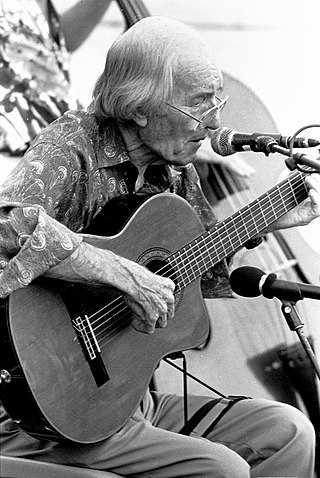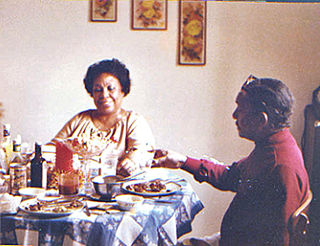Related Research Articles

Norman Granz was an American jazz record producer and concert promoter. He founded the record labels Clef, Norgran, Down Home, Verve, and Pablo. Granz was acknowledged as "the most successful impresario in the history of jazz". He was also a champion of racial equality, insisting, for example, on integrating audiences at concerts he promoted.

Callen Radcliffe Tjader Jr. was an American Latin Jazz musician, known as the most successful non-Latino Latin musician. He explored other jazz idioms, even as he continued to perform music of Afro-Jazz, the Caribbean, México and Latin America.

Mitchell Herbert Ellis, known professionally as Herb Ellis, was an American jazz guitarist. During the 1950s, he was in a trio with pianist Oscar Peterson.

Edmund Leonard Thigpen was an American jazz drummer, best known for his work with the Oscar Peterson trio from 1959 to 1965. Thigpen also performed with the Billy Taylor trio from 1956 to 1959.

Al McKibbon was an American jazz double bassist, known for his work in bop, hard bop, and Latin jazz.

Charlie Lee Byrd was an American jazz guitarist. Byrd was best known for his association with Brazilian music, especially bossa nova. In 1962, he collaborated with Stan Getz on the album Jazz Samba, a recording which brought bossa nova into the mainstream of North American music.
"Tenderly" is a popular song published in 1946 with music by Walter Gross and lyrics by Jack Lawrence. Written in the key of E♭ as a waltz in 3
4 time, it has since been performed in 4/4 and has become a popular jazz standard. Notable versions have been recorded by singers, such as Sarah Vaughan and Nat King Cole, and pianists, such as Art Tatum, Bill Evans and Peruchín.

At the Opera House is a 1958 live album by Ella Fitzgerald. The album presents a recording of the 1957 Jazz at the Philharmonic Concerts. This series of live jazz concerts was devised by Fitzgerald's manager Norman Granz; they ran from 1944 to 1983. Featured on this occasion, in 1957, are Fitzgerald and the leading jazz players of the day in an onstage jam session. The first half of the 1990 CD edition includes a performance that was recorded on September 29, 1957, at the Chicago Opera House, whilst the second half highlights the concert recorded on October 7, 1957, at the Shrine Auditorium, in Los Angeles. The original LP obviously included only the mono tracks (#10-18).
Monte Rex Budwig was a West Coast jazz double bassist, professionally known as Monty Budwig.

William Correa, better known by his stage name Willie Bobo, was an American Latin jazz percussionist of Puerto Rican descent. Bobo rejected the stereotypical expectations of Latino music and was noted for combining elements of jazz, Latin and rhythm and blues music.

Gerald Foster Wiggins was an American jazz pianist and organist.
Ernest Andrew Royal was a jazz trumpeter. His older brother was clarinetist and alto saxophonist Marshal Royal, with whom he appears on the classic Ray Charles big band recording The Genius of Ray Charles (1959).

"Willow Weep for Me" is a popular song composed in 1932 by Ann Ronell, who also wrote the lyrics. The song form is AABA, written in 4
4 time, although occasionally adapted for 3
4 waltz time.
Milton Holland was an American drummer, percussionist, ethnomusicologist, and writer in the Los Angeles music scene. He pioneered the use of African, South American, and Indian percussion styles in jazz, pop and film music, traveling extensively in those regions to collect instruments and learn styles of playing them.
Alvin Stoller was an American jazz drummer. Though he seems to have been largely forgotten, he was held in high regard in the 1940s and 1950s. He was best known for playing drums on both Mitch Miller's recording of "The Yellow Rose of Texas" and Stan Freberg's parody of Miller's recording.
John Anthony Pompeo, better known as Johnny Rae, was an American jazz drummer and vibraphonist.

Norman Gary Foster is an American musician who plays saxophone, clarinet, and flute. He is considered a crossover artist, performing jazz, pop, and classical music. He has been prominent in the film, television, and music industries for five decades, having performed on over 500 movie scores and with over 200 orchestras.

Edward Lozano Duran was an American jazz guitarist from San Francisco. He recorded often with Vince Guaraldi and was a member of the Benny Goodman orchestra during the 1970s.
"Invitation" is a song by Bronisław Kaper with lyrics by Paul Francis Webster, originally used in the film A Life of Her Own (1950). Though it was nominated for a Golden Globe award for Best Score in the original film, it only became a jazz standard after being used as the theme in the 1952 film Invitation. Tony Thomas notes that it was selected for the film for its degree of poignance. It is considered to be Kaper's second best known song after "On Green Dolphin Street". Jazzstandards.com describes it as a "lush and haunting score", and notes that it is most associated with John Coltrane, who recorded it in 1958. Howard Morgen, who arranged it for guitar, writes that the "haunting" tune has "long been recognized by jazz players for its potential as an interesting mood piece" and "still sounds fresh and contemporary today".
John William Heard was an American bass player and artist. His recording credits include albums with Pharoah Sanders, George Duke, Oscar Peterson, Count Basie, Zoot Sims, Ahmad Jamal, Frank Morgan, George Cables. His professional jazz performance career lasted from the 1960s to the early 2010s, during which he also worked as a visual artist, producing drawings, paintings, and sculptures.
References
- 1 2 Bryant, Clora, ed. (1999). Central Avenue sounds : jazz in Los Angeles. Berkeley, Calif. [u.a.]: Univ. of California Press. p. 243. ISBN 9780520220980.
- 1 2 Williams, Martin (1992). Jazz changes ([Online-Ausg.]. ed.). New York: Oxford University Press. p. 85. ISBN 978-0195058475.
- ↑ Jack, Gordon (2004). Fifties jazz talk : an oral retrospective. Lanham, Md. [u.a.]: Scarecrow Press. p. 42. ISBN 9780810849976.
- ↑ Ramsey, S. Duncan Reid ; foreword by Doug (2013). Cal Tjader : the life and recordings of the man who revolutionized Latin jazz. Jefferson, NC [u.a.]: McFarland. p. 64. ISBN 978-0786435357.
- ↑ Grimshaw, Jeremy (2011). Draw a straight line and follow it : the music and mysticism of La Monte Young. New York: Oxford University Press. p. 23. ISBN 978-0199740208.
- ↑ Tom Lord: The Jazz Discography (accessed online, October 8, 2014.
- ↑ Harrison, Max; Nicholson, Stuart; Thacker, Eric (1999). Essential jazz records (1. publ. ed.). London: Mansell. p. 91. ISBN 9780720118223.
- ↑ Billboard, February 11, 1956.
- ↑ Billboard, in its issue dated 19 August 1957, noted the closing of the club.
- ↑ Gavin, James (July 2011). Deep in a Dream: The Long Night of Chet Baker. Chicago Review Press. p. 130. ISBN 9781569769034.